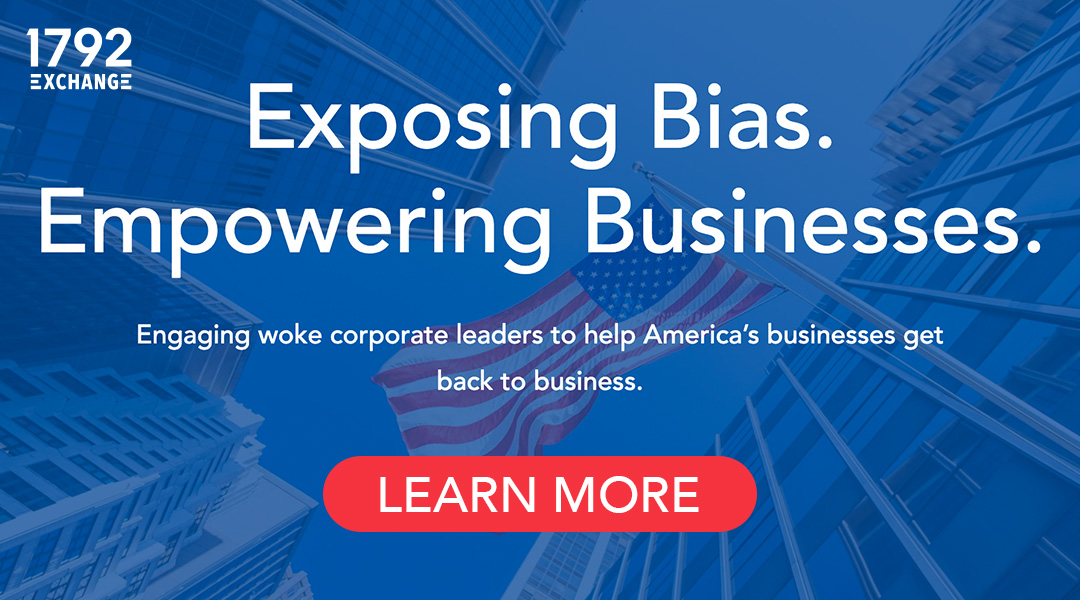The following content is the second in a five-part series sponsored by the 1792 Exchange. Click here to see the other installment.
How does offering sex change surgery for employees’ children boost a company’s profits or shareholder return?
That’s a question Breitbart News Editor-in-Chief Alex Marlow poses to 1792 Exchange CEO Daniel Cameron in a recent interview.
Cameron pinpoints the Human Rights Campaign (HRC) as the influence behind these kinds of corporate decisions. Though the name sounds innocent enough, the Human Rights Campaign is a hardcore leftwing organization “working to reshape America in a leftist ideology and mindset,” according to Cameron. The HRC is the largest LBGTQ+ political lobbying group in the world and receives millions from George Soros’ Open Society Foundation.
How is the Human Rights Campaign gaining influence?
It rates America’s biggest companies with its Corporate Equality Index, a survey that companies complete voluntarily. This survey includes questions about “affirmative transgender-inclusive healthcare benefits and removal of all broad exclusions to coverage across plan offerings.” Survey takers also receive points for “marketing or advertising to LGBTQ consumers.” Remember Dylan Mulvaney of Bud Light fame? Now you understand why Anheuser-Busch InBev would risk alienating millions of Bud Light drinkers to partner with a caricature-like transgender person to promote the beer brand. It’s all to gain points on a survey.
Why do companies care about the Human Rights Campaign survey?
It comes down to money. The Corporate Equality Index is part of the Environmental Social Governance (ESG) movement – a so-called “ethical investing” movement pushed by America’s top three investment firms: BlackRock, State Street Bank, and Vanguard. They are among the largest shareholders in our biggest publicly traded companies, and many companies are more interested in courting investment than they are worried about offending their consumers (although perhaps Anheuser-Busch InBev now takes a more measured view after losing a reported $1.4 billion in sales because of backlash to its transgender influencer marketing program).
The Human Rights Campaign is a toxic work environment for its own employees, so why are they telling other companies how to behave?
Marlow notes that the now defunct left-wing news outlet BuzzFeed reported that the Human Rights Campaign is “an incredibly toxic workplace, a discriminatory workplace environment.” So, Marlow asks, “Who put these people in charge? Why should they be the ones who are determining whether or not a corporation is ethical or operating aboveboard?”
“Well, to put it bluntly, Alex,” Cameron says, “the Human Rights Campaign should not be in charge of or an authority on what a corporation should do as it relates to their employees because, to your point, they’ve created an environment that is not a healthy one within their own organization.” He adds that the HRC also seems to be turning a blind eye to the latest information on transgender surgeries, as “European countries are scaling back on transgender surgeries because of the harms and consequences that occur down the road.” Companies that do not want to bend the knee to HRC pressure need to know that there is a way to push back and get their businesses back to neutral and focused on delivering great products instead of getting mired in divisive social issues, Cameron explains.
There is a counterbalance to the Human Rights Campaign, and it is the 1792 Exchange Spotlight Bias Reports.
The 1792 Exchange is pushing back against this woke ideology using a data-based approach with their “Spotlight Bias Reports,” which include:
Corporate Bias Rating Database – The leftwing Human Rights Campaign tells companies that the more woke things they do, the better. The 1792 Exchange says the opposite: the more you focus on business, the better. This database rates nearly 3,000 companies on how much of a risk they are taking by engaging in woke policies. The ratings help you determine the likelihood a company will cancel a contract or client, or boycott, divest, or deny services based on viewpoints or beliefs. It alerts customers and shareholders to what corporations are doing.
Proxy Database – This includes a data table for state officials, showing the percentage of pro-ESG and anti-ESG shareholder proposals that each state’s pension funds supported in 2023, according to data from their investment managers. It also equips shareholders with information on controversial shareholder proposals that are coming up in shareholder meetings, so that they can be prepared.
Board Bias Database – If you’ve ever wondered why a corporation is making certain decisions to wade into political issues, it largely has to do with the board members at a public corporation or the C-suite executives. This database names them, their political affiliations, and their political contributions. Using this database, it’s easy to see how lopsided some corporations are when it comes to their leadership – heavily left-leaning, with little representation from the other side.
The information at 1792 exchange.com can help companies get back to neutral and focus on business. It also can help you decide where you want to do business as a customer or consumer, and where you want to put your investments as a shareholder.
Learn more at 1792exchange.com. Scroll down on the homepage to sign up for the 1792 Exchange newsletter.



